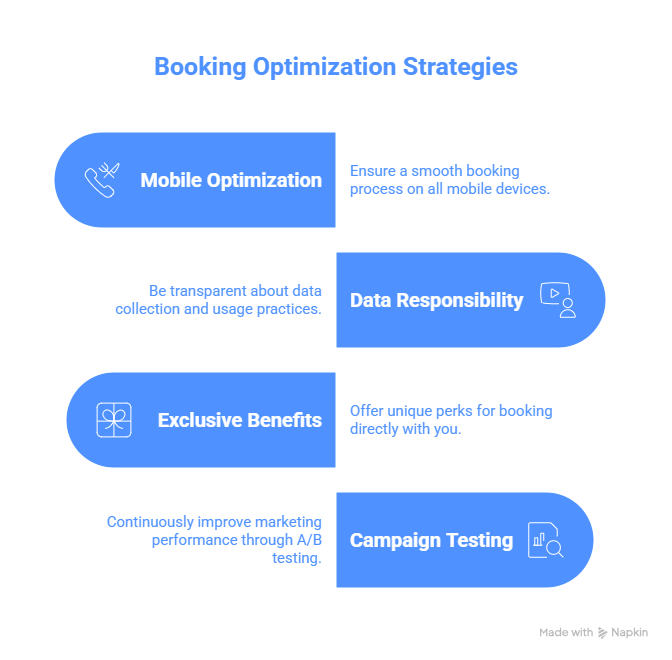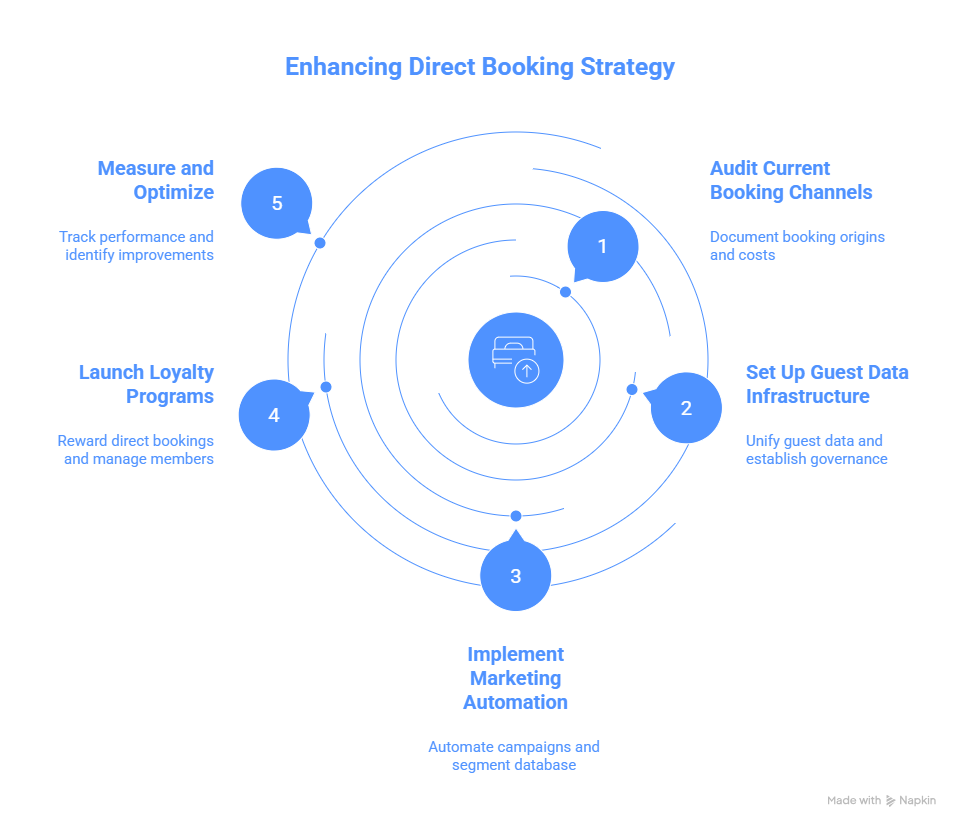Key Highlights: Salesforce for Hospitality Industry
- OTA commissions and platform dependency demand strategic solutions, shifting revenue to owned channels
- Unified guest profiles, personalized campaigns, and AI engagement drive direct bookings and loyalty.
- Marketing Cloud, Experience Cloud, Sales Cloud, Service Cloud, Einstein AI, Loyalty Management, and Mobile Studio work together.
- Major hotel chains have dramatically improved case resolution times, booking conversion, and guest satisfaction.
- Build personalized journeys, optimize funnels, leverage past guest data, and automate workflows.
- Track conversion rates, channel mix, guest lifetime value, and attribution to measure success
Hotels grappling with high OTA commission fees, fragmented guest data, and limited direct booking capabilities can find solutions to these challenges in Salesforce for hospitality industry platforms.
Salesforce is an all-in-one platform that combines guest management, marketing automation, revenue optimization, and data analytics in one place.
Top hospitality brands like Marriott International, Wynn Resorts, Shangri-La Hotels, and Minor Hotels have already supercharged different aspects of their business with Salesforce products like:
- Sales Cloud (guest relationship management)
- Service Cloud (guest support and concierge services)
- Marketing Cloud (personalized campaigns and loyalty programs)
- Experience Cloud (direct booking portals)
- CRM Analytics (revenue and occupancy insights).
Why is Salesforce for Hospitality Industry Important?
Salesforce’s core solution – Sales Cloud – helps centralize guest data, track preferences and booking history, enhance personalized communication, and manage OTA relationships strategically, enabling data-driven revenue optimization.
Salesforce CRM offers multi-user access controls that ensure seamless collaboration and information access, as well as quick retrieval of data, boosting productivity.
Does Salesforce make sense for someone with primarily hospitality experience?
byu/604stt insalesforce
How Salesforce Helps Hotels Drive Direct Bookings?
Personalized Guest Communication at Scale
Salesforce hospitality CRM transforms how hotels communicate with guests by creating a unified view of every interaction. Instead of generic emails, you send targeted messages reflecting each guest’s preferences, booking history, and behavioral patterns.
L’hotel Group saw dramatic improvements in email performance after implementing personalized Marketing Cloud campaigns open rates and click-through rates increased significantly. Understand how marketing cloud implementation helps hotels maximize campaign performance with better targeting. The platform enables you to segment audiences based on dozens of criteria: past booking patterns, loyalty status, room preferences, amenities used, and special occasions.
Data-Driven Marketing Campaigns
Salesforce travel and hospitality solutions unify data from your property management system, booking engine, loyalty platform, and guest interactions into a single source of truth. Wyndham Hotels unified millions of guest records using Data Cloud, creating comprehensive profiles that power personalized booking experiences.
To learn more about implementing similar data cloud solutions for your property, explore how unified guest data transforms operations.
Salesforce integration services enable this data unification by connecting disparate systems seamlessly.
Seamless Booking Experience Management
Salesforce for travel industry platforms connect all touchpoints of the booking journey, ensuring consistency whether guests start on mobile, continue on desktop, or call your reservation center. Wyndham increased year-over-year bookings by 75% by optimizing their digital booking experience.
Experience Cloud enables you to create branded portals where past guests can easily access booking history, make modifications, and rebook with saved preferences.
Guest Relationship Building and Retention
Salesforce hospitality Cloud excels at nurturing long-term relationships through loyalty program management, personalized follow-up, and anticipatory service. Service Cloud provides agents with complete context during every interaction. Salesforce consulting services help hotels design and implement comprehensive guest relationship strategies.
Real-Time Analytics for Booking Optimization
Salesforce for hospitality provides comprehensive dashboards and reporting showing exactly which marketing efforts drive direct bookings and which channels deliver the highest ROI. Real-time visibility into booking funnel performance lets you identify and fix drop-off points immediately.
Booking platform within Salesforce
byu/Haensfish insalesforce
7 Salesforce Features That Boost Direct Bookings
1. Marketing Cloud for Targeted Guest Outreach
Marketing Cloud enables sophisticated, multi-channel campaigns that reach guests with the right message at the right moment. Journey Builder orchestrates automated touchpoints across email, SMS, mobile push, and social media based on guest behavior and preferences.
Einstein AI-powered recommendations analyze engagement patterns to determine optimal send times, subject lines, and content for each recipient.
2. Experience Cloud for Branded Booking Portals
Experience Cloud creates secure, branded portals for different guest segments. Past guests can log in to see booking history, saved payment methods, and preferences, making rebooking frictionless.
These portals can be customized for corporate clients managing group bookings, travel agents accessing negotiated rates, or loyalty members viewing exclusive offers.
Building these custom portals requires technical expertise hire Salesforce developers experienced in portal development
3. Sales Cloud for Group and Corporate Bookings
While leisure travelers often book online, group and corporate bookings represent high-value opportunities benefiting from sales team involvement. Sales Cloud provides tools to manage these complex, multi-stakeholder sales processes. Hiring a Salesforce consultant can help you design the right B2B booking workflows.”
Salesforce Sales Cloud services optimize these B2B booking processes for maximum efficiency.
4. Service Cloud for Pre-Stay Engagement
Service Cloud is a powerful tool for proactive pre-stay engagement that increases ancillary revenue. Agents can reach out before arrival to confirm special requests, suggest room upgrades, or book spa treatments.
Omnichannel support means guests can start conversations via chat, continue over email, and complete by phone—with agents seeing full context at every touchpoint.
5. Einstein AI for Predictive Guest Preferences
Einstein AI analyzes historical data to predict guest preferences and needs before they book. Einstein Service Replies significantly reduce average handle time by automatically generating contextually relevant responses.
Einstein Recommendations powers automated product and offer suggestions based on what similar guests have purchased. Interested in implementing these AI features? See how Salesforce Einstein GPT works in practice.
6. Loyalty Management for Repeat Bookings
Loyalty Management provides comprehensive tools to design, launch, and manage programs rewarding direct bookings. Create tier structures, point earning rules, and redemption options that incentivize guests to book directly rather than through OTAs.
Gamification elements like tier challenges and bonus point promotions create urgency and excitement around direct booking.Explore Salesforce loyalty management best practices for proven program structures.
7. Mobile Studio for SMS and App Notifications
Mobile Studio brings your direct booking message to the device that’s always with your guests. SMS campaigns achieve significantly higher open rates than email, making them ideal for time-sensitive offers or last-minute availability.
Location-based triggers enable contextually relevant messaging. Push notifications to your branded app keep your property top-of-mind between visits.
Strategies to Increase Direct Bookings with Salesforce
Build Personalized Guest Journeys
Journey mapping identifies every touchpoint from first awareness through post-stay follow-up. Salesforce Journey Builder automates these touchpoints based on guest behavior, ensuring timely, relevant communication.
Start with abandoned booking recovery—when someone starts but doesn’t complete a reservation, trigger an automated email offering assistance or a special incentive.
Create Compelling Loyalty Programs
Design tiered programs that reward direct bookings more generously than OTA bookings. Use Salesforce to automate tier upgrades, milestone rewards, and renewal incentives.
Exclusive perks for direct bookers might include free breakfast, late checkout, room upgrades, or waived resort fees.
Implement Dynamic Pricing and Offers
Use real-time data and predictive analytics to adjust pricing and offers based on demand, competitor rates, and guest-specific factors. Create personalized offers based on guest segments—past guests see loyalty discounts, first-time visitors see introductory offers.
Optimize Your Booking Funnel
Map the entire booking journey and identify friction points where potential guests abandon. Use Salesforce analytics to track conversion rates at each stage and test improvements systematically.
Mobile optimization is critical when most hotel bookings come through mobile devices. Ensure your booking process works flawlessly on smartphones. Build role-specific views with Salesforce reports and dashboards to monitor these metrics.
Leverage Past Guest Data for Remarketing
Your most valuable marketing asset is the list of past guests who’ve already experienced your property. Use Salesforce to segment this audience by recency, frequency, value, and preferences, then create targeted remarketing campaigns.
Enable Easy Repeat Booking Process
Remove every barrier to rebooking. For authenticated users, display their previous room type, dates, and preferences with one-click confirmation. Save payment information securely so returning guests don’t re-enter credit card details.
Automating Direct Booking Workflows
Automated Email Campaigns for Past Guests
Set up automated workflows that nurture past guest relationships without manual intervention. Welcome series for first-time guests, birthday recognition emails, booking anniversary reminders, and seasonal promotions can all run automatically.
Personalized Offers Based on Guest Behavior
Track browsing behavior on your website and booking engine to understand guest interests. If someone researches spa services, trigger relevant follow-up offers featuring those elements.
Smart Retargeting for Abandoned Bookings
Abandoned booking recovery represents low-hanging fruit—these guests showed clear intent but didn’t complete. Salesforce tracks abandonment and triggers recovery sequences automatically.
First email goes out within 1-2 hours with a direct link back to their saved booking. Follow up after 24 hours with a limited-time incentive.
Post-Stay Follow-Up for Future Reservations
The post-stay period is critical for securing repeat bookings. Automate a satisfaction survey 2-3 days after checkout. Follow positive feedback with immediate direct booking incentives.
Integrating Salesforce with Your Booking Engine
Connecting Property Management Systems
Seamless PMS integration is fundamental to maintaining accurate, real-time availability and rates across all channels. MuleSoft, Salesforce’s integration platform, provides pre-built connectors for major PMS vendors.
Syncing Booking Data in Real-Time
Real-time synchronization prevents guests trying to book rooms that aren’t actually available. Ongoing maintenance is critical Salesforce managed services ensure your integrations stay optimized.”
Creating Unified Guest Profiles
Data Cloud creates a single, comprehensive profile for each guest by harmonizing data from multiple sources: booking history, preference data, loyalty program details, service interactions, and feedback surveys.
Tracking Attribution Across Channels
Understanding which marketing channels drive direct bookings enables smarter budget allocation. Salesforce tracking captures the complete customer journey from first touch to booking confirmation.
Measuring Direct Booking Success with Salesforce
Key Metrics to Track
Direct booking conversion rate measures what percentage of website visitors complete reservations. Channel mix shows your booking distribution across OTAs, direct website, phone reservations, and walk-ins. Customer acquisition cost (CAC) for direct channels versus OTA commissions provides clear ROI perspective.
Guest lifetime value (GLV) demonstrates the long-term impact of building direct relationships.
Custom Dashboards for Booking Performance
Salesforce’s customizable dashboards let you visualize the metrics that matter most. Create role-specific views: marketing teams see campaign performance and conversion funnels, revenue managers see pricing and occupancy patterns.
ROI Analysis and Reporting
Calculate platform ROI by comparing direct booking revenue increases against implementation and operating costs. Track return on marketing spend (ROMS) for each campaign and channel.
Channel Mix Optimization
Analyze which OTAs deliver guests most likely to become direct bookers on future trips. Use analytics to track which channels deliver profit, not merely volume.
Best Practices for Maximizing Direct Bookings
Optimize Mobile Booking Experience
Mobile optimization is non-negotiable when most bookings come through mobile devices. Test your booking process on various devices to identify friction points. Implement mobile-specific features like one-tap booking for returning guests and thumb-friendly navigation.
Use Guest Data Responsibly
Build trust through transparent data practices. Explain what information you collect and how you use it. Salesforce complies with numerous global digital regulations to protect sensitive data.
Create Exclusive Direct Booking Benefits
Make the value proposition for booking direct unmistakably clear. Exclusive benefits might include best rate guarantees, free breakfast for direct bookers, late checkout privileges, or accumulated loyalty points.
Test and Refine Your Campaigns
Salesforce’s built-in A/B testing capabilities make it easy to continuously optimize marketing performance. Test subject lines, send times, offer structures, and landing page designs.
Common Mistakes to Avoid
Neglecting Guest Data Quality
AI insights are only as good as the underlying data. Implement data governance policies that specify how information is captured, validated, and maintained. Learn best practices for Salesforce data management governance.
Over-Reliance on Discounting
While promotional rates can drive bookings, competing solely on price erodes margins. Focus on value-based marketing that highlights unique amenities and experiences.
Poor Integration Between Systems
Disconnected systems create frustrating guest experiences. MuleSoft helps build integrations ensuring smooth data flow, but integration requires planning and ongoing maintenance.
Ignoring Mobile Users
Mobile users have different needs than desktop users. Ignoring mobile optimization means losing bookings to OTAs that have invested heavily in mobile experiences.
Getting Started with Salesforce for Direct Bookings
Step 1: Audit Your Current Booking Channels
Document where bookings currently originate and calculate the true cost of each channel including commissions, marketing spend, and staff time. Identify your best guests and analyze where they originated.
Step 2: Set Up Guest Data Infrastructure
Begin with Data Cloud implementation to unify guest information from all sources. Define your data model and establish governance policies for data quality, privacy compliance, and access controls.
Step 3: Implement Marketing Automation
Start with high-impact automated campaigns: welcome series for new guests, post-stay thank-you with surveys, and booking anniversary reminders. Segment your database and create targeted campaigns for each segment.
Step 4: Launch Loyalty Programs
Design a program structure rewarding direct bookings more generously than OTA bookings. Use Loyalty Management to track points, manage tiers, and automate member communications.
Step 5: Measure and Optimize
Establish baseline metrics before implementation so you can quantify improvements. Create monthly reporting cadences reviewing performance against goals and identifying optimization opportunities.
Key Takeaways
The Salesforce for hospitality industry platform provides comprehensive tools to shift booking mix toward profitable direct channels while building stronger guest relationships. Success requires unified guest data, personalized automated marketing, and seamless integration across your technology stack.
Hotels using AI for customer service see a 25% increase in direct bookings, demonstrating clear ROI for technology investment. Start with quick wins like automated remarketing campaigns and abandoned booking recovery. Build toward more sophisticated implementations leveraging AI, predictive analytics, and omnichannel orchestration.
The hotels winning the direct booking battle aren’t just adopting new technology—they’re using it to deliver the personalized, seamless experiences that modern travelers expect.
FAQs
How does Salesforce help reduce OTA commissions?
Salesforce reduces OTA dependency with targeted email and SMS campaigns guiding travelers to direct booking engines. Personalized marketing, loyalty incentives, and seamless booking experiences create compelling reasons to book direct rather than through commission-based OTA channels.
Can Salesforce integrate with my existing booking engine?
Yes. Salesforce offers extensive integration opportunities with property management systems and booking engines. MuleSoft provides pre-built connectors for major hospitality platforms, while APIs enable custom integrations, ensuring real-time data synchronization.
What’s the typical increase in direct bookings after implementing Salesforce?
Results vary by property and implementation scope, but hotels using AI for customer service see a 25% increase in direct bookings. Wyndham increased year-over-year bookings by 75% through optimized digital experiences. Most hotels see measurable improvements within 6-12 months.
How long does it take to see results?
Quick wins like abandoned booking recovery and past guest remarketing can drive results within weeks. Comprehensive implementations delivering transformative ROI typically require 6-18 months as systems integrate, data quality improves, and automated campaigns optimize.
Is Salesforce suitable for small independent hotels?
Absolutely. Salesforce Essentials provides scaled-down pricing and functionality appropriate for smaller properties. Even independents benefit from marketing automation, guest relationship management, and commission savings from increased direct bookings.
What marketing tools in Salesforce are most effective for direct bookings?
Marketing Cloud enables targeted email and SMS campaigns that boost direct bookings by guiding travelers to booking engines. Journey Builder automates personalized touchpoints throughout the guest lifecycle. Einstein AI optimizes send times and content for maximum conversion.
Does Marriott use Salesforce?
Marriott uses its own proprietary systems like the Bonvoy loyalty platform and internal management tools rather than Salesforce. However, some individual properties may use various CRM tools for specific operational needs.
What is a hospitality CRM and how does it differ from a general CRM?
Hospitality CRM focuses on reservations, room inventory, guest preferences, and real-time operational management. It differs from general CRM by prioritizing guest lifecycle and service delivery over sales pipelines and marketing funnels used in other industries.

Hasan Mustafa
Engineering Manager Salesforce at Folio3
Hasan Mustafa delivers tailored Salesforce solutions to meet clients' specific requirements, overseeing the implementation of scenarios aligned with their needs. He leads a team of Salesforce Administrators and Developers, manages pre-sales activities, and spearheads an internal academy focused on educating and mentoring newcomers in understanding the Salesforce ecosystem and guiding them on their professional journey.

